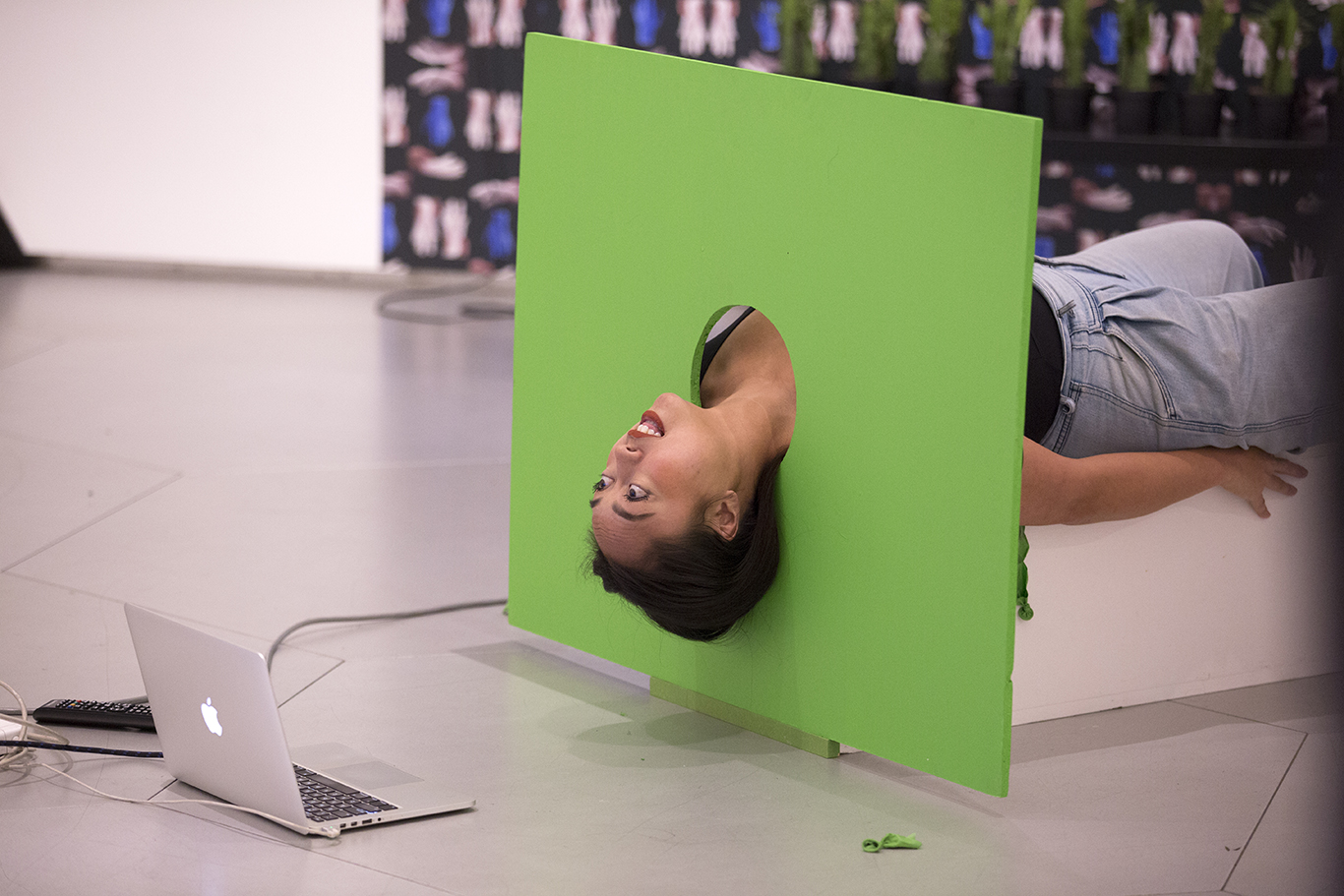
Feminist Manifestos Continue to Challenge the Status Quo
Gabriela López Dena spent months searching through dozens of feminist manifestos written over centuries by feminist activists, artists, and writers, that boldly state their demands and advocate for change. López Dena, a Vera List graduate student fellow, art and social justice, ultimately selected 23 manifestos that she determined were relevant and meaningful enough to be performed by a diverse group of women from across the New School community, including students, professors, administrators, alumni, and maintenance staff.
Feminist Manifestos was presented as a two part public program in December and López Dena was chosen by the Vera List Center for Art and Politics to curate the event as part of their freedom of speech seminar series. The first part of the program featured the women chosen to read and perform these manifestos, in selected spaces across the university. While the manifestos were created in many countries throughout different eras, they all had one thing in common: challenging patriarchal oppression throughout history.
“Feminist Manifestos is important as it anchors the freedom of speech seminar series in The New School campus: each reading was precisely situated in a specific location and inscribed into its history, the demands of a particular manifesto that was relevant to that site,” said Carin Kuoni, the Vera List Center’s director and chief curator. “For instance, it was exhilarating to hear Gaby (López Dena) read in Spanish outside President Van Zandt’s office, the Zapatista Women’s opening address to the First International Gathering of Women in Struggle, written by Insurgenta Erika on behalf of other milicianas of various ranks.”
As part of López Dena’s fellowship, she has been researching manifestos, feminism, and urbanism, and was chosen to moderate the second part of the program, an evening panel discussion with feminist scholars and visual artists.
“Manifestos are about recognizing that circumstances are unacceptable and saying this is wrong,” said López Dena, who is an architect from Mexico City. “It’s about proposing a path to move forward, and stating this is how it should be done.”
Caroline Garcia, a visual artist and a New School graduate student in international studies, was one of the programs 15 participants, and turned the reading of her manifesto into an inventive form of performance art. Garcia read from a 2018 work called “Xenofeminist Manifesto” by a collective called Laboria Cuboniks, that she performed in two separate hour-long performances at the Arnold and Sheila Aronson Galleries. Garcia read the text while lying upside down on a bench with her head and neck secured uncomfortably– wedged into a square board with a hole cut out that was barely large enough to accommodate her. After finishing a portion of the manifesto, Garcia played audio excerpts from past Miss Universe pageants that featured interviews with women who had been previously crowned Miss Philippines. As the audio clip played, she blew up a balloon, fastened the balloon to the post, and clutching a blowpipe, burst the balloon with a loud crack that made several onlookers wince. After the balloon popped, she resumed her inverted reading of the text, repeating the exercise with the audio and blowpipe until the entire manifesto was finished.
“The first hour was rough, but the second performance was seamless” Garcia acknowledges. “I was sent three or four different manifestos, but this was the one most relevant to my practice and my approach to being an artist and female in this landscape.”
“No more futureless repetition on the treadmill of capital, no more submission to the drudgery of labour, productive and reproductive alike, no more reification of the given masked as critique, Garcia read from the manifesto. “Our future requires depetrification. Xenofemiinst is not a bid for revolution, but a wager on the long game of history, demanding imagination, dexterity and persistence.”
Garcia is a native Australian of Filipino descent and in her work, she examines Filipina archetypes and rejects the way they are often treated like “exotic and domestic commodities.” She has also studied head hunting among Philippine tribes and by using the blowpipe, she says she was reclaiming the weapon– and challenging notions that head hunting was a ritual practiced only among men.
Other Feminist Manifestos performers and readers included Hannah Roodman, who read a 1979 manifesto by Agnes Denes, in the elevators at the Albert and Vera List Academic Center; Gal Cohen, accompanied by her baby daughter, reading Manifesto for Maintenance Art 1969 by Mierle Laderman Ukeles in the lobby of The Sheila Johnson Design Center; and Quenessa Barnes, reading Women’s Declaration on Food Sovereignty by Nayéléni: Forum for Food Sovereignty, 2007, at the University Center’s sushi bar.
“Some people just jumped into the readings and performances,” López Dena says about the onlookers. “Some people got interested after a few seconds of being surprised, wanting to know more.”
At the evening panel, López Dena discussed the ideas and conditions from which these manifestos emerged and how they “catalyzed new forms of cooperation and collective action.” Silvia Federici, a philosopher, scholar, and activist, discussed the issue of wages for housework and how women have always done the work of raising children unpaid. Becca Albee, a visual artist and musician, spoke about how women are often uncredited for academic and book research. Chiara Bottici, an associate professor of philosophy at the New School for Social Research, explored the intersection of feminism and anarchism, and A.L. Steiner, a visual artist and teacher, examined the work being done to establish fair wages in New York City.
“For me personally, it was great to collaborate with such a diverse group of people,” López Dena said. “It was really important that we invited a group of diverse women from across the university.”